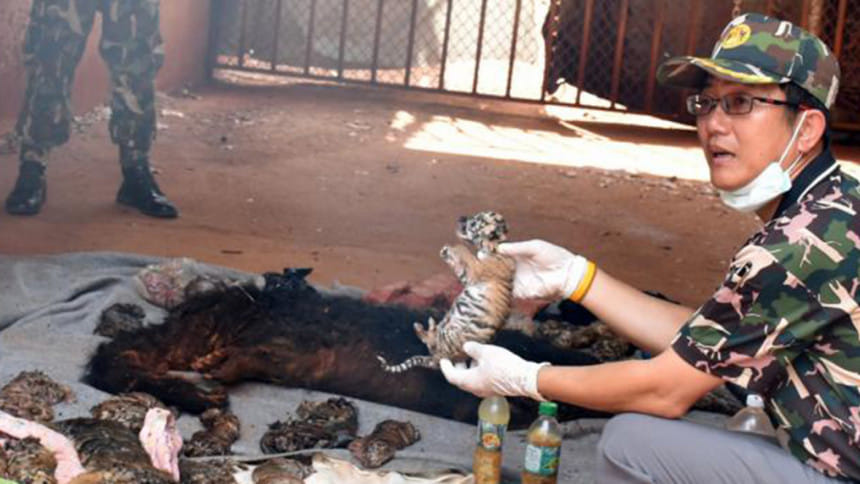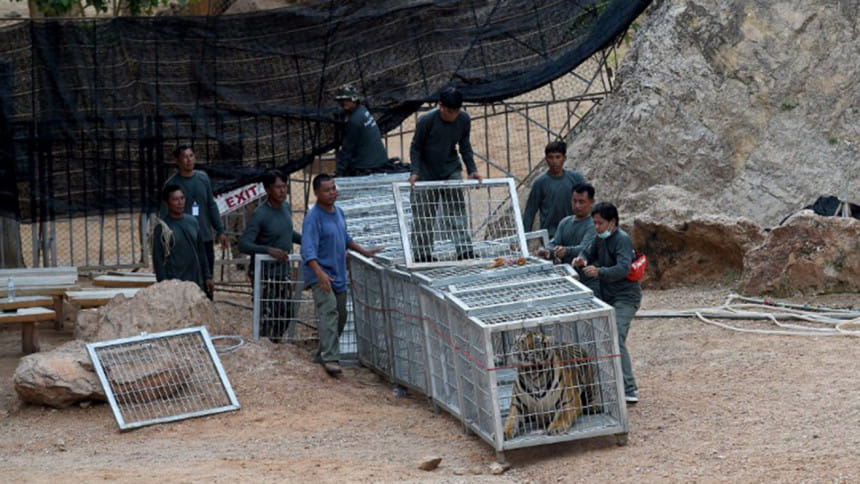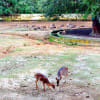Tiger cub bodies found at Thai temple

Forty dead tiger cubs have been found in a freezer at a Thai Buddhist temple accused of wildlife trafficking and animal abuse.
Police and wildlife officials started an operation on Monday to remove all the living tigers at the Tiger Temple.
Pictures from journalists at the scene posted to social media showed the 40 cubs lined up on the floor.
The site in Kanchanaburi is a popular tourist attraction but has been closed to the public since the raid.
Police Colonel Bandith Meungsukhum told AFP news agency that wildlife officials would file new criminal charges after the discovery, and added that the cubs were just one or two days old when they died.
He said it was not yet clear how long they had been dead.
The dead cubs "must be of some value for the temple", Adisorn Nuchdamrong, from Thailand's Department of National Parks, told Reuters news agency. "But for what is beyond me."
Tiger bones and body parts are used in traditional Chinese medicine.
Monks at the temple were not available for comment but have previously denied trafficking allegations.
In a statement on its Facebook page, the temple said the mortality rate for tiger cubs at the temple was "comparatively low" and that it used to cremate dead cubs but a vet changed the policy in 2010 "probably to keep as proof against the allegations of selling cubs".
Chris Coots, an Englishman who has volunteered with the tigers, told the BBC that the remains were frozen as proof that cubs who died of natural causes were not being sold into the wildlife trade.
He said: "A number of the bodies are in a state of decay as they have been there over five years.
"It would seem strange to keep the bodies that long if the intent was to sell them. This will be easily clarified by decomposition tests."
Body parts from other animals were also found in a freezer, Tom Taylor, from Wildlife Friends Foundation, told the BBC.
A reporter from the Khaosod news website said he had seen animal intestines in containers, a dead boar and other animal parts.
Dozens of living tigers have already been removed, out of 137 at the temple. The 1,000-strong police operation is due to continue all week.
Some workers and volunteers at the temple spoke out against the operation.
But the World Wildlife Fund welcomed the news and called on the Thai government to prohibit the temple from keeping tigers in future.
Since 2001, authorities have been locked in a battle with the monks at the temple to confiscate the tigers after allegations of wildlife trafficking and abuse surfaced.
The monks deny any wrongdoing.

The temple, officially known as Wat Pha Luang Ta Bua, has been a stop on many tourists' itineraries for decades. Visitors could pose for photographs with the tigers or help with their exercise routine.
But animal rights campaigners have long campaigned to close it down. Peta said animals there are "imprisoned and denied everything that is important to them".

 For all latest news, follow The Daily Star's Google News channel.
For all latest news, follow The Daily Star's Google News channel. 







Comments